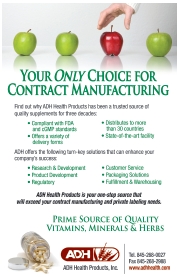It has been a long wait, but the Federal Trade Commission (FTC) announced on October 1 that its “Guides for the Use of Environmental Marketing Claims,” which have come to be known as the “Green Guides,” have been finalized for public consumption.
After a two-year period of public and industry input since the last revision, the FTC presented product makers with its definitive views on what is and is not permissible in the way of marketing a product’s “environmental” qualities. The Guides are indirectly enforceable by the FTC, by virtue of the FTC Act.
The main points of emphasis begin with the guideline that marketers should not make broad, unqualified general environmental benefit claims in product labeling or advertising. These include terms like ‘green’ or ‘eco-friendly,’ and they are advised against them under the notion that such broad claims are difficult to substantiate. FTC reserves the right to go after marketers for “green washing,” environmental marketing that they deem to be misleading or false.
Marketers should instead qualify general claims with specific environmental benefits associated with a product, and such qualifications should be clear and prominently displayed. Small, unimportant benefits should not be highlighted, as the FTC believes that consumers typically understand environmental claims to represent something significant. Finally, if such a qualified claim is made, marketers should subject the overall net environmental impact to an analysis, to see if the practice being highlighted actually benefits the environment.
product, and such qualifications should be clear and prominently displayed. Small, unimportant benefits should not be highlighted, as the FTC believes that consumers typically understand environmental claims to represent something significant. Finally, if such a qualified claim is made, marketers should subject the overall net environmental impact to an analysis, to see if the practice being highlighted actually benefits the environment.
The Guides also lay out specific ways to handle carbon offset claims in product marketing, as well as caution marketers about the use and display of “green” seals and certifications so as not to mislead consumers by implying general environmental benefits. The Guides are also tough on other categories, including claims that products are “free-of” a substance, claims about recycled content and claims about source reduction (such as “10 percent less waste”). Marketers should instead convey that the product generates “10 percent less waste than our previous product.”
In its notice in The Federal Register, FTC explained that for any enforcement action it takes, it must prove that “the challenged act or practice is unfair or deceptive in violation of Section 5 of the FTC Act.” They also point out that the Guides do not preempt any federal, state or local laws, but compliance with any such law does not necessarily mean marketers would be exempt from FTC action.
According to Justin J. Prochnow, shareholder of Greenberg Traurig LLP, these finalized guides hold a take-away message for companies doing eco-marketing. “FTC wants you to be as specific as possible about your claims,” he says. He notes that business-to-business green marketing claims are also covered in the Guides, as in the case of a building materials supplier claiming its product is eco-friendly, but without substantiation. Prochnow believes that there will not necessarily be a large uptick in enforcement action on green marketing issues, except perhaps in egregious cases affecting large numbers of consumers, because FTC simply has higher priorities.
Published in WholeFoods Magazine, November 2012 (online 10/5/12)










